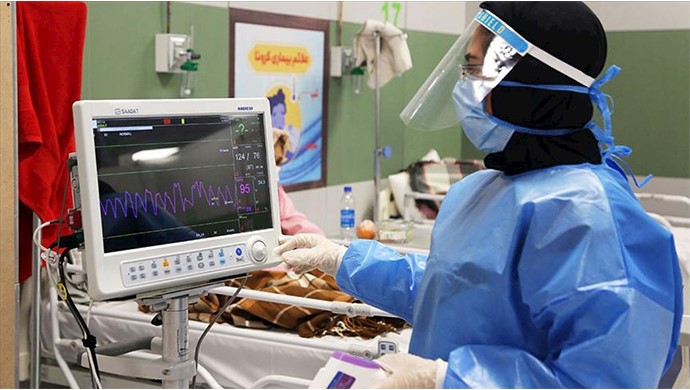Reporting by PMOI/MEK
Iran, April 17, 2020—Over 30,700 people have died of the novel coronavirus in 294 cities checkered across all of Iran’s 31 provinces, according to reports tallied by the Iranian opposition People's Mojahedin Organization of Iran (PMOI/MEK) as of Friday afternoon local time, April 17. The official death count declared by the regime is 4,958, less than a sixth of the actual figure.
The death toll in various provinces include: 2,470 in Razavi Khorasan, 2,460 in Gilan, 1,260 in Khuzestan, 1,195 in Alborz, 1,070 in Eastern Azerbaijan, 825 in Hamedan, 800 in Western Azerbaijan, 485 in Yazd, and 355 in Sistan and Baluchestan. This is in addition to the figures reported from other provinces.
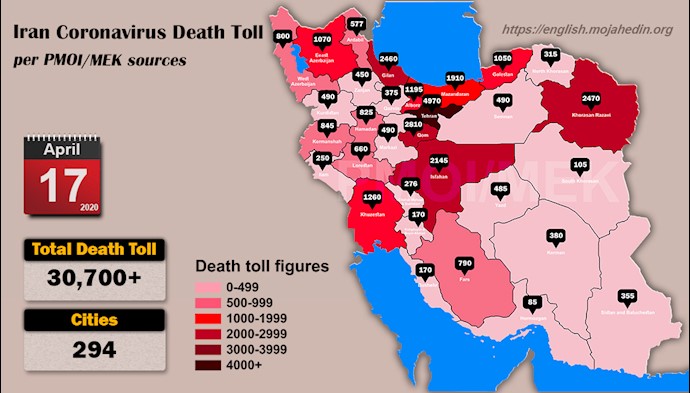
Over 30,700 dead of coronavirus (COVID-19) in Iran
After three months of denial and cover-up, regime officials are now acknowledging that they knew about COVID-19 cases in Iran since January. Health minister Saeed Namaki said, “Since January, when [coronavirus] cases were declared in China, I requested an emergency meeting with the First Vice President on a holiday and requested that flights from and to China be canceled. And after learning about the first cases in our country, I suggested restrictions such as closing universities, schools, gatherings, Friday prayers, weddings and mourning, religious ceremonies, Rahian-e Nour gatherings…”
Habibollah Sayyari, the coordinating deputy of the army chief of staff, said, “The army predicted the spread of the disease on January 19. We learned about the spread of the disease in China by monitoring the websites of WHO, and we declared it to our forces to stay alert.”
The Iranian regime confirmed the coronavirus outbreak on February 19, after declaring two COVID-19 deaths in Qom.
Meanwhile, the spokesperson for the Medical Sciences University of Gilan warned about a new wave of coronavirus infection and said, “We are still in the epidemic phase of COVID-19. The reopening of some businesses should not mislead the people. We are still far from controlling the coronavirus in Gilan.”
The Iranian regime has issued top-secret orders to all its units to limit internet communication and prevent intelligence leaks.
“Considering the publication of various organizational documents by police employees… issue orders to prevent such security breaches and announce necessary reservations in this regard to your personnel,” the orders read in part.
“There should be no membership in any (internet) groups associated to dissidents and such political currents,” refrain from providing “organizational information,” “information resulting in tension among the people, and/or tension between the people and the armed forces and the government,” and “information that lead to tensions between armed forces organizations.”
The Iranian opposition coalition National Council of Resistance of Iran (NCRI) Anti-Terrorism and Security Commission released documents of these orders.
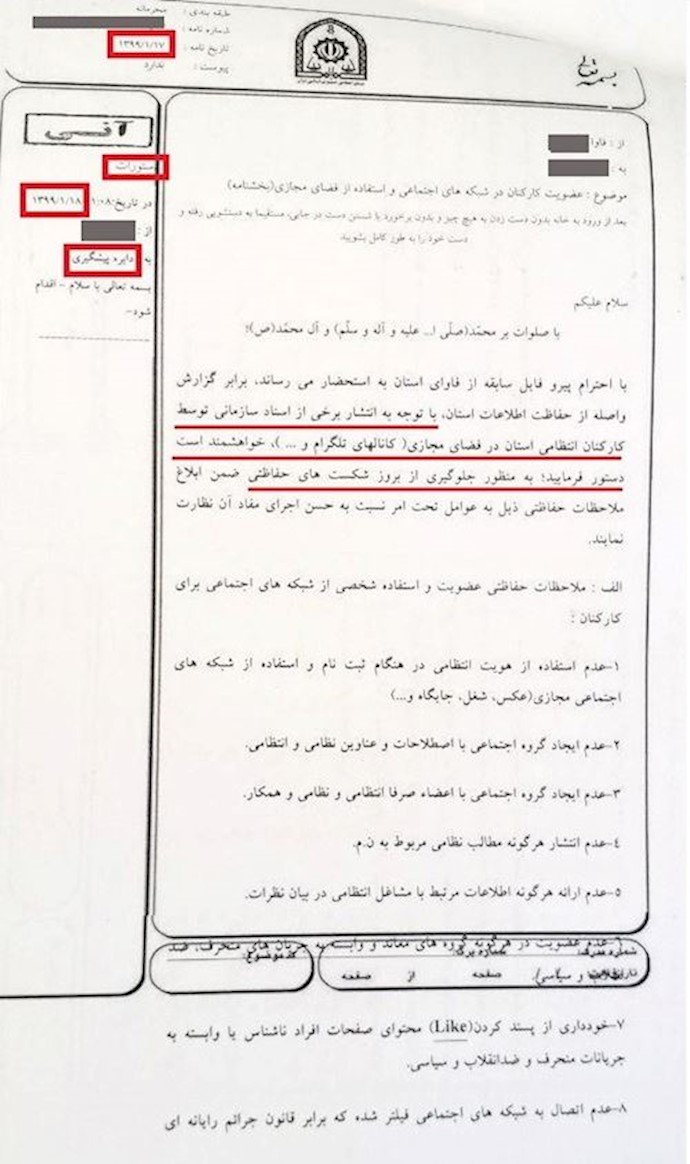
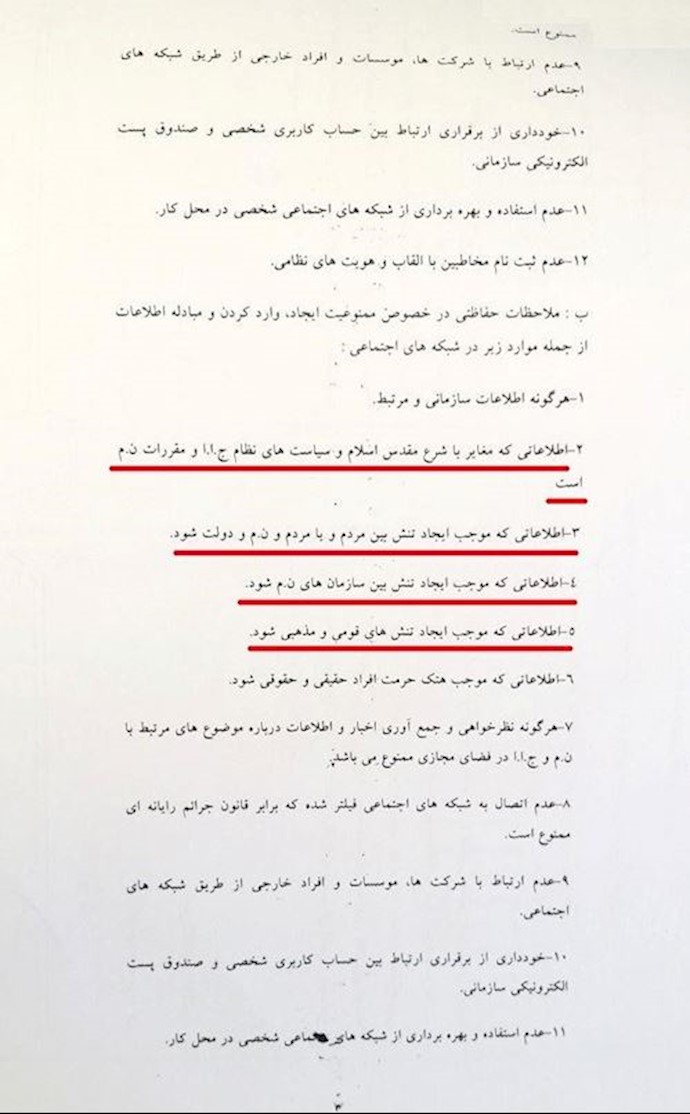
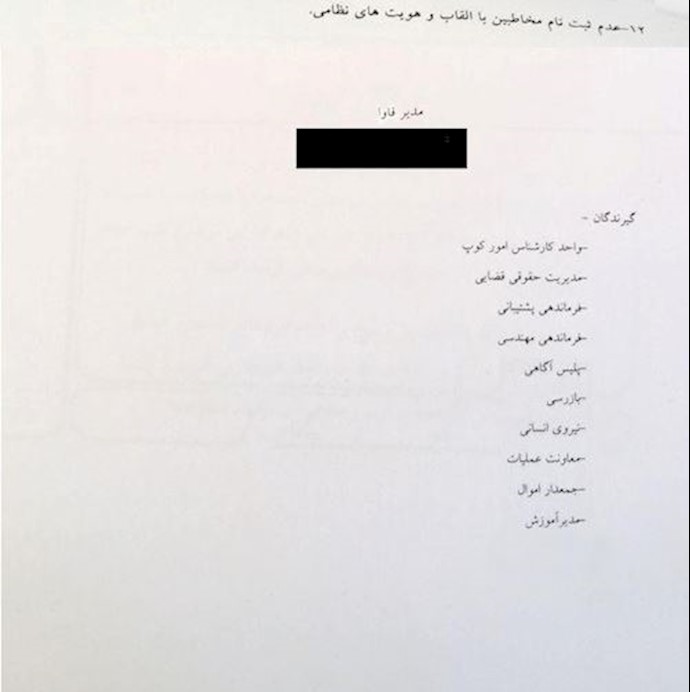
Documents revealed by NCRI
Security reservations on membership and personal use of social media for employees:
1. Refraining from using security identity while registering and using social media networks (images, occupation, position and…).
2. Refraining from establishing social groups with security and military titles.
3. Refraining from establishing social groups with only members of the security and military apparatus, and colleagues.
4. Refraining from publishing any type of military criteria related to the Armed Forces.
5. Refraining from presenting any information regarding security occupations among one’s opinions.
6. Refraining from membership in any (internet) groups associated to dissidents and such political currents.
7. Refraining from liking the criteria posted by unknown individuals or those associated to dissidents and such political currents.
8. Refraining from links to filtered social media networks that are banned by law.
9. Refraining from establishing contact with foreign companies, institutions and individuals through social media networks.
10. Refraining from establishing ties between personal accounts and organizational email accounts.
11. Refraining from using personal social media accounts at work.
12. Refraining from registering contacts with military titles or identifications.
Security reservations regarding establishing, entering and exchanging information, including the following in social media networks:
1. Any type of organization information and related criteria.
2. Information that is against the sacred sharia of Islam, the policies of the Islamic Republic of Iran and regulations of the Armed Forces.
3. Information resulting in tension among the people, and/or between the people and the Armed Forces and the Government.
4. Information resulting in tension between the Armed Forces’ organizations.
5. Information resulting in tensions among ethnicities and religions.
6. Information insulting individuals or entities.
7. Expressing any opinions or gathering news and information about issues related to the Armed Forces and the Islamic Republic on social media.
8. Refraining from joining filtered social media networks banned by law.
9. Refraining from establishing connection with foreign companies, institutions and individuals through social media.
10. Refraining from establishing a contact between personal social media accounts and organizational email accounts.
11. Refraining from using personal social media accounts at work.
12. Refraining from registering contacts with military titles or identifications.
These orders specifically reveal that the NCRI’s recent revelations about the scope of the coronavirus catastrophe and unveiling the role of the regime’s security and military apparatus has infuriated the mullahs and left them utterly hopeless.
Parallel to these ridiculous orders, measures continue to arrest innocent people under the pretext of spreading rumors about COVID-19 in Iran.
“Forty-eight individuals involved in spreading rumors about the novel coronavirus were identified and arrested by FATA members (Iran’s internet police) in this province,” said Brigadier General Bakhshali Kamrani, commander of the Hamedan Province Police, to the state-run ROKNA news agency on Thursday, April 16.
Iran coronavirus outbreak death toll interactive map


